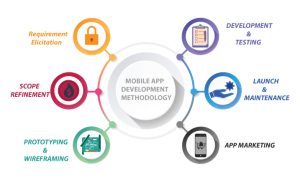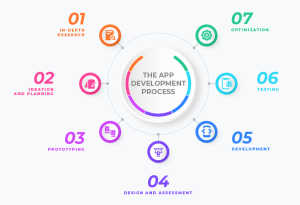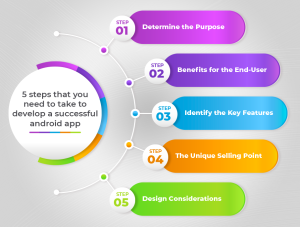Unlocking the World of Android
In today’s digital age, mobile devices have become an integral part of our lives. Among the various mobile operating systems, Android stands out as a dominant force, powering billions of smartphones and tablets worldwide. In this comprehensive guide, we will delve into the world of Android, exploring its origins, key features, app development, and its impact on the modern digital landscape.
Understanding Android
Android, developed by Google, is an open-source mobile operating system designed primarily for touchscreen devices. It made its debut in 2007 with the release of the Android 1.0 operating system and has since undergone significant transformations. Android has gained immense popularity due to its versatility, customizability, and the vast ecosystem of apps available through the Google Play Store.
 Key Features of Android
Key Features of Android
- Open Source: Android’s open-source nature allows developers to access and modify its source code, fostering innovation and customization. This has led to a diverse range of Android-based devices and experiences.
- User-Friendly Interface: Android offers an intuitive and user-friendly interface, characterized by customizable home screens, widgets, and an extensive notification system. Users can tailor their devices to suit their preferences.
- App Ecosystem: The Google Play Store is home to millions of apps, ranging from productivity tools and entertainment apps to games and utilities. Android’s app ecosystem is a driving force behind its popularity.
- Multi-Tasking: Android supports multi-tasking, enabling users to switch between apps seamlessly and run multiple apps simultaneously. This enhances productivity and convenience.
- Google Integration: Android seamlessly integrates with Google services like Gmail, Google Drive, Google Maps, and Google Assistant, providing a unified experience for users.
Android Versions
Android has seen numerous versions over the years, each introducing new features and improvements. Some notable Android versions include:
- Android 2.2 (Froyo): Introduced the ability to install apps on external storage, improving device storage management.
- Android 4.0 (Ice Cream Sandwich): Brought a unified user interface for both smartphones and tablets, enhancing consistency across devices.
- Android 5.0 (Lollipop): Introduced Material Design, a visual language that offered a more visually appealing and intuitive user interface.
- Android 6.0 (Marshmallow): Focused on improving battery life, security, and app permissions.
- Android 8.0 (Oreo): Introduced features like Picture-in-Picture mode, notification channels, and improved performance.
- Android 10: Brought a system-wide dark mode, enhanced privacy controls, and better gesture navigation.
- Android 11: Focused on improving messaging and device controls, making it easier to manage conversations and connected devices.
- Android 12: The latest version as of this writing, it offers a refreshed user interface, enhanced privacy indicators, and performance improvements.
 Android App Development
Android App Development
One of Android’s most significant strengths is its app development ecosystem. Here are some key points about Android app development:
- Programming Languages: Android app development primarily involves programming in Java or Kotlin. Kotlin, a more modern and concise language, has gained popularity among developers.
- Development Tools: Android Studio, the official integrated development environment (IDE) for Android, provides a rich set of tools and resources for developers.
- App Architecture: Developers use various architectural patterns, such as Model-View-Controller (MVC) or Model-View-ViewModel (MVVM), to design robust and maintainable Android apps.
- User Interface Design: Android apps use XML-based layouts and support Material Design guidelines for creating visually appealing and user-friendly interfaces.
- Testing and Debugging: Android Studio offers robust testing and debugging tools to ensure app quality and performance.
 Impact of Android
Impact of Android
Android’s influence extends far beyond mobile devices. It has significantly impacted various aspects of our lives and the digital landscape:
- Mobile Communication: Android has revolutionized mobile communication, providing a platform for voice and video calls, text messaging, and social media interactions.
- Productivity: Android devices are used in businesses and organizations worldwide for tasks like email communication, document editing, and project management.
- Entertainment: Android has transformed entertainment, offering a plethora of apps for streaming music, movies, games, and e-books.
- Navigation and Maps: Google Maps, powered by Android, has redefined navigation, providing real-time directions, traffic updates, and location-based services.
- IoT (Internet of Things): Android’s versatility extends to IoT devices, enabling users to control smart home appliances, wearables, and connected vehicles.
Privacy and Security
While Android offers a wide range of benefits, privacy and security concerns have emerged over the years. To address these issues, Google has implemented several security measures, including:
- App Permissions: Android prompts users to grant specific permissions to apps, ensuring that apps only access necessary data.
- Google Play Protect: This built-in security feature scans apps for malware and threats before installation.
- Frequent Updates: Google regularly releases security patches and updates to address vulnerabilities.
- Biometric Authentication: Android supports biometric authentication methods like fingerprint recognition and facial recognition for added security.
 The Future of Android
The Future of Android
The future of Android looks promising, with continuous innovations and improvements on the horizon. Here are some areas to watch:
- Foldable Devices: Android is adapting to the trend of foldable smartphones and tablets, providing support for flexible displays and unique form factors.
- 5G Integration: Android devices will leverage the capabilities of 5G networks, enabling faster download speeds and low-latency communication.
- AI and Machine Learning: Android will increasingly incorporate AI and machine learning technologies, enhancing user experiences and device capabilities.
- Privacy Enhancements: Google is committed to enhancing user privacy through features like app permissions and privacy dashboard.
- Sustainability: Android is making efforts to reduce its environmental impact, focusing on energy efficiency and sustainability in device manufacturing.
In conclusion, Android has evolved from a humble beginning to become a dominant force in the world of mobile technology. Its open-source nature, extensive app ecosystem, and user-friendly interface have made it a preferred choice for millions of users and developers worldwide. As Android continues to adapt to emerging technologies and user needs, it is poised to remain a driving force in the digital landscape for years to come. Whether you’re a developer looking to create innovative apps or a user seeking the latest features and experiences, Android offers a world of possibilities to explore and enjoy.

